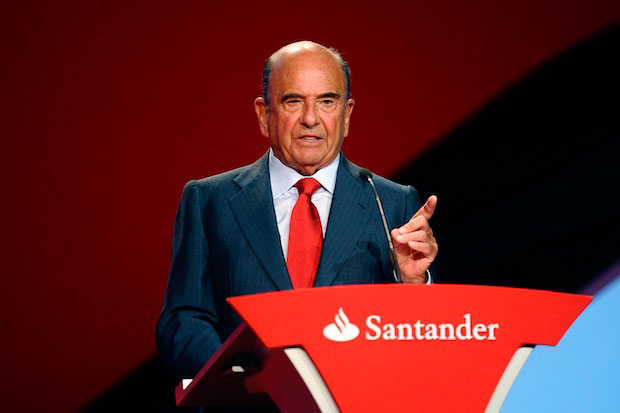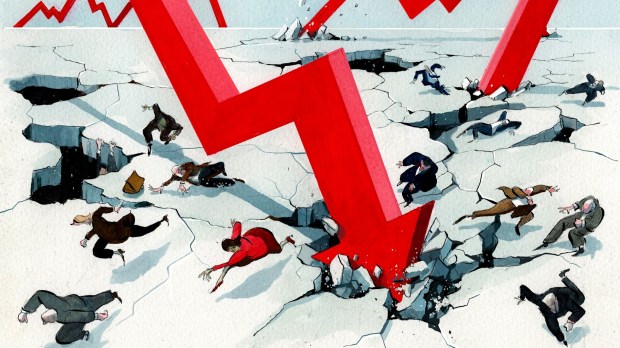Four years ago, I wrote that I knew no dark rumours about Santander, the rising force in UK high street banking, but that history taught me banks which expand rapidly and globally ‘always come unstuck in the end… partly because the challenge of risk control across such vast portfolios becomes impossible… Banks that have been driven by one powerful personality also tend to lose management grip, and start finding skeletons in cupboards, as the big man comes to the end of his tenure.’ The big man in question was third-generation chairman Emilio Botín — who died in post last week, aged 79. Santander is now Europe’s largest financial group, but despite years of economic turmoil and real-estate bust in its Spanish home market, and despite my own forebodings, it still looks pretty strong. So what was Emilio’s secret?
The answer, I suspect, was a combination of simplicity, technology, and team spirit — three factors that have proved sadly deficient in many other big banks. Botín’s principles were those of the old-fashioned small-town banker he was born to be: ‘If you don’t know your customers very well, don’t lend them any money.’ But his bank’s computers were anything but old-fashioned — and Santander pulled out of buying a bundle of RBS branches largely because the systems put in by Fred Goodwin were so poor it was impossible to ensure ‘a seamless journey’ for customers. As for esprit de corps, one associate told me: ‘Emilio was entirely devoted to the bank. He thrived on work and expected those around him to do the same. When you were with him, you had the sense that he was sizing you up: is this person any good? Is he committed? If the answers were yes, you were fine. His own commitment and loyalty inspired fierce loyalty in return.’
Given all that, it makes more sense than it might otherwise have done for Emilio to be succeeded in the chair by his daughter Ana Patricia, who acquitted herself well as head of Santander UK and has long been in a position to study his methods. Meanwhile, I see the Barclays board has ignored my advice (I’m sensing a pattern here) to pick a no-nonsense female chairman in the mould of Ana Patricia: instead they have gone for a higher level of corporate correctness and appointed a no-nonsense Scotsman. He is John McFarlane — a veteran banker with ANZ, Standard Chartered and Citibank on his CV — and I hope his visa is in order.
After the vote
No-nonsense businesspeople will be very much what’s needed in the aftermath of the Scottish Catastrophe, as it will surely come to be known whichever way the vote has fallen. No nation, independent or semi-autonomous, can hope to prosper on the basis of the wild welfare promises of the SNP, unsupported by any plan to attract investment and stimulate growth. Only a resurgent private sector can drag Scotland out of the tax-and-spend peat bog into which this referendum has driven it deeper than ever — and that will take quite some grit on the part of entrepreneurs, given the fundamental hostility of both the SNP and Scottish Labour.
But grit —even granite ruthlessness — is a characteristic shared by the outstanding Scottish business builders of the past. Think of Dr William Jardine of Lochmaben, who became the great opium trader of Canton; or Dunfermline-born Andrew Carnegie, robber baron of 19th-century American steel; or Robert Fleming, Dundonian financier of American railroads. In more recent times I have personally encountered three who typify the breed: Sir Ian McGregor from Kinlochleven was the implacably tough National Coal Board boss who defeated the 1984 miners’ strike; Sir William Purves from Kelso (happily still with us) was a formidable chairman of the Hong Kong Bank; and Gordon Baxter was the hard-as-nails force behind the cosy image of his family’s soup and jam enterprise at Fochabers.
Today’s Scottish business role-model is Michelle Mone, Glaswegian inventor of the Ultimo push-up bra, who looks a lot friendlier than all those old-school chaps. But I suspect she’s just as tough a cookie — and she threatened to move her company to England in the event of a ‘yes’. That’s the other problem with Scottish business talent: so much of it, down the centuries, has been exercised outside Scotland. Who will now persuade the wealth creators to stay at home and pick up the bills?
Watch the oil price
One thing that might benefit Scotland, given predictions of falling North Sea revenues, is a rise in oil prices — which is what we’d normally expect at a time of Middle East mayhem. But to the surprise of some speculators the graph is currently pointing the other way: prices have fallen 15 per cent since mid-June, with West Texas Intermediate down to just above $90 a barrel at the beginning of this week. Why? Because US production is at a 28-year high, Libya is going strong and Iraqi production has not been as seriously disrupted by Islamic State insurgency as was feared. On the other side of the equation, Chinese industrial growth registered a mere 6.9 per cent in August, its weakest annualised rate since 2008, and western demand has slackened — not helped by European jitters over the outcome of the Scottish Catastrophe.
Meanwhile, the slothful sheikhs of Opec have not convened an emergency meeting because they say the trend is seasonal and the price will recover — but if they’re wrong and it goes on down, all sorts of consequences follow. Though the slump of 2008 saw lows of around $40, a level of $100-plus is now needed for most big oil companies to remain adequately profitable. US shale drillers consider $80 to $85 to be the ‘sweet spot’ at which capital is attracted into their sector, but many deep-water or otherwise inaccessible oil exploration projects only become viable at levels of $120 or more. A sustained phase of lower prices would switch off an awful lot of new drilling — and make us all that little bit more vulnerable to what happens next in the turbulent Islamic world.
Got something to add? Join the discussion and comment below.
Get 10 issues for just $10
Subscribe to The Spectator Australia today for the next 10 magazine issues, plus full online access, for just $10.
You might disagree with half of it, but you’ll enjoy reading all of it. Try your first month for free, then just $2 a week for the remainder of your first year.
















Comments
Don't miss out
Join the conversation with other Spectator Australia readers. Subscribe to leave a comment.
SUBSCRIBEAlready a subscriber? Log in